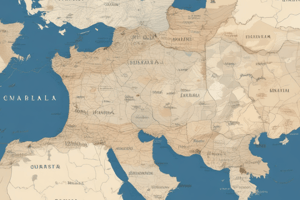Podcast
Questions and Answers
What is the total area of Turkey, including both land and water?
What is the total area of Turkey, including both land and water?
- 982,019 square kilometers (correct)
- 301,382 square miles
- 780,580 square kilometers
- 379,177 square miles
Which of the following countries does Turkey share a land border with?
Which of the following countries does Turkey share a land border with?
- Egypt
- Syria (correct)
- Israel
- Lebanon
What is the total length of Turkey's coastline?
What is the total length of Turkey's coastline?
- 7,200 miles
- 4,474 kilometers
- 7,200 kilometers (correct)
- 4,474 miles
Which of the following rivers does not flow through Turkey?
Which of the following rivers does not flow through Turkey?
What type of climate does Turkey experience in many areas?
What type of climate does Turkey experience in many areas?
What is the capital city of Turkey?
What is the capital city of Turkey?
What type of environmental challenges has Turkey experienced?
What type of environmental challenges has Turkey experienced?
What is the primary language spoken in Turkey?
What is the primary language spoken in Turkey?
What is the political system in Turkey?
What is the political system in Turkey?
Which of the following is not a major component of Turkey's economy?
Which of the following is not a major component of Turkey's economy?
Which of the following cultural festivals is held in Turkey?
Which of the following cultural festivals is held in Turkey?
What is the relationship between Turkey and its neighboring countries?
What is the relationship between Turkey and its neighboring countries?
Flashcards
Turkey
Turkey
Country located in southeastern Europe and southwestern Asia, bridging two continents.
Modern Republic of Turkey
Modern Republic of Turkey
Established in 1923 as a secular, parliamentary democracy.
Mustafa Kemal Ataturk
Mustafa Kemal Ataturk
Founder of the modern Republic of Turkey.
Ankara
Ankara
Signup and view all the flashcards
Turkey's Borders
Turkey's Borders
Signup and view all the flashcards
Seas bordering Turkey
Seas bordering Turkey
Signup and view all the flashcards
Terrain of Turkey
Terrain of Turkey
Signup and view all the flashcards
Major Rivers in Turkey
Major Rivers in Turkey
Signup and view all the flashcards
Turkey's Economy
Turkey's Economy
Signup and view all the flashcards
Government of Turkey
Government of Turkey
Signup and view all the flashcards
Turkey's Population
Turkey's Population
Signup and view all the flashcards
Turkey's cuisine
Turkey's cuisine
Signup and view all the flashcards
Study Notes
Turkey
Brief Overview
Turkey, officially known as the Republic of Turkey, is located in southeastern Europe and southwestern Asia. It spans across Anatolia (Asia) and Thrace (Europe), bridging two continents with its unique geographical position. Turkey was established as a secular, parliamentary democracy in 1923 under the leadership of Mustafa Kemal Ataturk, who is considered the father of the modern republic. The country has a population of approximately 84 million people, and its capital city is Ankara.
Geography
Turkey covers an area of around 780,580 square kilometers (301,382 square miles), including 982,019 square kilometers (379,177 square miles) of water. It shares land borders with eight countries: Armenia, Azerbaijan, Bulgaria, Georgia, Greece, Iraq, Iran, and Syria. Additionally, Turkey has a total coastline of 7,200 kilometers (4,474 miles) that stretches along three seas: the Mediterranean, the Aegean, and the Black Sea.
The terrain of Turkey varies widely, ranging from high mountains in the east and northeast (such as Mount Ararat and Mount Erciyes) to lowlands in the western regions. The country also features numerous rivers, including the Euphrates and Tigris, which flow through Iraq, Syria, and Turkey before emptying into the Mediterranean Sea.
Climate and Environment
Turkey experiences a diverse range of climates, with hot, dry summers and mild, wet winters in many areas. The interior regions tend to have harsher conditions, particularly in the summer months. The country has experienced various environmental challenges, such as droughts, soil erosion, and deforestation, which have impacted its ecosystem and wildlife.
Culture and Society
Turkey's culture is influenced by its history, which includes elements from the Roman, Byzantine, and Ottoman Empires. The country boasts centuries-old cities like Istanbul (formerly Constantinople) and Edirne, as well as numerous archaeological sites and historic monuments. Turkey is also known for its vibrant cuisine, incorporating flavors from Mediterranean and Middle Eastern cuisines.
Turkey has a diverse population made up of various ethnic groups, including Turks, Kurds, Armenians, Greeks, and others. The country celebrates numerous cultural festivals and events throughout the year, such as the International Ankara Jazz Festival and the Istanbul Film Festival.
Economy
Turkey's economy was historically centered around agriculture, but it has since diversified into industries like manufacturing, construction, and services. The country is a member of the Organization for Economic Cooperation and Development (OECD) and is working toward joining the European Union. Turkey is also part of NATO and plays an active role in international organizations like the United Nations and the World Trade Organization.
Government and Politics
The government of Turkey operates under a presidential system, with the President serving as both head of state and head of government. The country has a multi-party system and holds regular elections to determine its leadership. However, Turkish politics have been marked by periods of instability, including military coups and political crises. The country's relations with neighboring countries, particularly Syria, Iran, and Greece, have often been strained due to territorial disputes and regional conflicts.
Studying That Suits You
Use AI to generate personalized quizzes and flashcards to suit your learning preferences.




